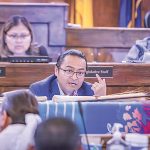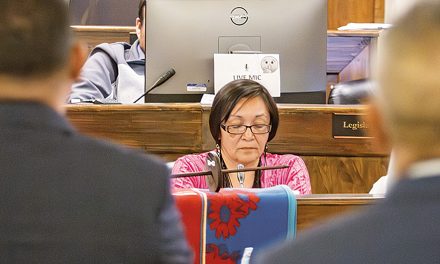
50 Years Ago: MacDonald gives first major interview to Associated Press
Navajo Tribal Chairman Peter MacDonald gave his first major interview to the Associated Press this week, giving tribal members an idea of some of the changes he was thinking about for the tribal government.
The interview was with Howard Graves, an AP writer from Albuquerque. Graves had been writing about the tribe for several years, going to the reservation about once a year interviewing then Chairman Raymond Nakai in an effort to see the how the tribal government was doing.
Nakai reportedly didn’t want to do these interviews, feeling that all media were out to get him, but his aides convinced him to go along because it would give him a chance to go after his enemies and show how important he was.
But if Nakai hated doing these interviews, Graves indicated he may have dreaded them even more.
It wasn’t that he thought Nakai wasn’t important enough, or because as leader of the nation’s largest tribe he tended to be involved in new battles every year with the BIA, the tribal council or one or more of the members of Congress.
It was a more personal reason. He didn’t like Nakai and felt that a lot of what Nakai said was just political rhetoric meant to make him look good to both his people and people off the reservation. He also hated the fact that after his articles were published, Nakai would claim he had been misquoted.
After the second time this happened, Graves began taping the interview but that didn’t stop Nakai from criticizing what he had written because it either didn’t put him in the best light or praise and he thought Graves didn’t understand what Nakai was saying.
This may have been the truth because Graves said he had a hard time understanding Nakai’s position on some subjects because Nakai would often ramble during the interview.
When it came to MacDonald, it was the exact opposite. The articles he did after interviewing MacDonald were picked up by other papers and often had actual news value. And as MacDonald got better known he also became more powerful as a national tribal leader.
His importance became even more evident after he help start the Council of Energy Resource Tribes, which represented the interests of a number of energy rich tribes at a time when exploitation of oil, natural gas and coal was a national obsession.
Graves also said he enjoyed interviewing MacDonald because he was personable and obviously enjoyed being interviewed. And MacDonald would find himself in the middle of all kind of controversies.
When MacDonald was suspended by Council in 1989 and the reservation began seeing demonstrations and riots, during that time Graves was writing articles about MacDonald and the tribe two or three times a year. These articles got so much play by papers throughout the country that Graves was nominated for a Pulitzer Prize.
The big news from that first interview was MacDonald’s plans to give tribal members more protection in their jobs and force business owners in the reservation to comply with provisions in their lease to give preference to Navajos in hiring.
And he soon made good on his promise to do this with the creation of the Office of Navajo Relations and the Navajo Labor Commission to help protect the rights of Navajo workers.
For the first time, Navajos had somewhere to go if they felt they had been unjustly fired or because a non-Navajo was hired for a position they felt they were qualified for.
As can be expected, employers hated the change because it made it more difficult to fire Navajos who didn’t work out or who violated one of more of the company’s or organization’s rules.
And it didn’t help that the man hired to be the head of the labor office, Tom Brose, was a strong supporter of the rights of the Navajo workers and someone who was willing to go after anyone who he felt violated tribal laws to protect Navajo workers.
\It became harder to fire Navajo employees. Employers soon learned that if you wanted to make a firing stick, you had to make sure you had the paperwork to justify the firing and you gave employees warnings in writing that their job performance was inadequate.
The tribal department that seemed to have the biggest problem with the new department was the police because of accusations that personnel actions were based on personal vendettas rather then poor performance by an employee.
MacDonald also made it known that the tribal government had to stop hiring non-Navajos for tribal jobs. To hire a non-Navajo, the tribal government had to prove there were no Navajos qualified for the position and non-Navajos who were hired had to spend part of their time training a Navajo to take over when they stepped down.
When MacDonald took office, there were more non-Navajos holding the top positions in the tribal government. There were some departments, such as the tribe’s Justice Department, where most of the high-paying positions were filled by non-Navajos.
Within two years, many of the non-Navajos had been replaced by tribal members. The Justice Department and other tribal offices that hired attorneys were given a waiver because of the lack of Navajo lawyers who had the necessary experience to provide adequate legal experience to represent tribal interests.








 Highway 264,
Highway 264, I-40, WB @ Winslow
I-40, WB @ Winslow